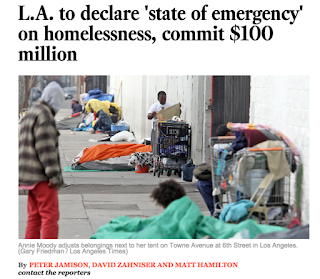 |
| THE LA TIMES/9.22.15 |
Homelessness is LA has risen 12% since 2013 and only continues to increase.
“It’s time to get real, because this is literally a matter of life and death,” said Councilman Mike Bonin. He spoke of a “collective failure of every level of government to deal with what has been a homeless crisis for generations and is exploding and exacerbating now.”
These public statements coincided with the Civic Hack Night I attended with Machiko last night, which allowed for panelists ranging from non-profits to government leaders to discuss why and how LA has developed this epidemic and how we can help. Through monthly Civic Hack Nights at Impact Hub, Hack for LA brings coders, designers, entrepreneurs, students, government agencies, activists, and other civically engaged individuals together to solve the LA region’s biggest civic and social challenges.
"How do you fix homelessness? You give someone a house."
Chris Ko, United Way
Los Angeles has the largest homeless veteran population in the United States. In addition, Skid Row based in on the eastern side of DTLA only houses about 10% of the homeless population in Los Angeles. If you have been there, then to think about the staggering number of homeless in LA is heartbreaking. To preface the rest of this, I am operating on the assumption that readers understand that homelessness is not a choice. (Substance abuse, mental health issues, including PTSD, marginalization, abuse, the economic downturn, physical health issues, lack of rehabilitation services, etc. are just some of the reasons that any of us could lose our homes.)
The panelists last night, which included leaders from United Way, Downtown Women's Center, and Jovenes, spoke of the economics of "Housing First." Essentially, based on public services, hospitalizations, law enforcement interventions, etc., keeping someone on the street costs roughly $40-60k a year. However, providing housing options, whether it start with rental subsidies and going to permanent housing, and cost 20k-40k LESS than that. [Reading Malcom Gladwell's Million Dollar Murray for more insight on this.]
The simplest way to put it, for me at least, is using Maslow's Hierarchy of Needs. Without shelter, food, water, a human being physically cannot function. Expecting a person without a home to "go out and get a job," is impractical, uneducated, and insensitive. How do you show up to an interview without having an opportunity to shower? Without a mailing address? After sleeping on unsafe streets, exposed to elements and without support? (This doesn't even address more nuanced issues of, for example, transgender youth, an over-represented population, who are stigmatized, marginalized, and are not even provided an opportunity to apply for work because their identifying documents do not match the gender they are OR veterans suffering from PTSD, who need immediate health care options.)
Another point raised during the panel was preventing homelessness. In an ideal world, we would be at that point. For instance, Salt Lake City has reduced its number of homeless from roughly 1900 to 200-300, almost eradicating the issue. However, in LA, there is a scaling issue. There are currently an estimated 30,000-50,000 homeless individuals in Los Angeles. That is the crisis NOW. There are initiatives that attempt to prevent homelessness. For instance, studies show that if you were homeless as a child, you have a heightened risk of homeless as an adult. LAUSD has an initiative to identify at-risk families and provide support. That is great work. But it isn't addressing the current issues.
Currently, from what I heard last night, non-profits, government agencies, and advocates are working on:
1. resource allocation to address chronic homelessness (i.e. homelessness lasting over one year or four bouts of homelessness over three years)2. coordinated entry systems (linking and collaborating service providers so there are always options open for clients - something that I work on in violence prevention programming.
3. innovative housing options: rapid rehousing, permanent housing development for youth similar to a dorm situation, rental subsidies, etc.
I loved my experience at Impact Hub last night and I look forward to more events. Not only was the panel eye-opening, but it demonstrated to me the multiple access points for people across sectors to collaborate on to provide services to those in need. It was also inspirational because there are aspects of homelessness that link directly to my work in violence prevention programming that I didn't know before and I hope to expand on some new ideas in that area.
So please check out the links I provided and let me know if you'd like to talk further on any of this! xx
No comments:
Post a Comment